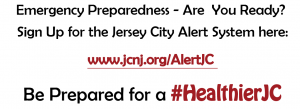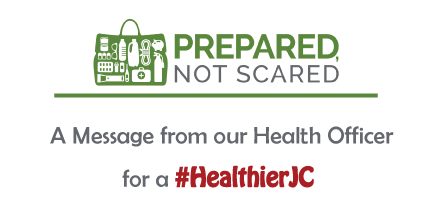A Message from our Health Officer, Paul Bellan-Boyer

Emergencies and disasters come in all sizes. A house fire may affect a single family, a storm or hurricane an entire region, and a pandemic can affect the whole globe.
The steps you take now to PLAN and PREPARE – just in case – can help you and your family get through an emergency.
These proven resources are drawn from ready.gov, and links at the bottom of this article will help you be ready, if and when.
In some situations you will need to shelter in place, and in others you may need to evacuate to a safer location. But even before you pack your go-bag or stock up on canned goods…
PLAN so you will be ready
FIRST: Plan to be informed
- Jersey City Alerts / Signup at: jcnj.org/AlertJC
- Emergency radio
SECOND: Plan to have your most important information
- Important contacts & communications plan (https://www.ready.gov/kids/make-a-plan).
Here you’ll find a simple way to make sure everyone in your family knows how to stay in contact and get re-connected
- Where to meet: near your home, and further away
- Critical documents: birth certificates and identity documents, insurance and financial documents. If you keep these together in a sealed waterproof folder, it’s easy to grab, and also easy to find when you need them for ordinary reasons. You may want to keep a few of your most previous photos.
THIRD: Plan to have what you need. Please start by considering the needs of everyone in your household, especially those with special needs, disabilities, children, and pets.
If you need to leave (your go-bag):
- Emergency cash supply; bank cards
- Critical medications – ask for prescriptions so you have an extra refill (30-90 days) always on hand
- A packed bag with clothes and toiletries for 3-7 days
- Cellphone charging, extra battery pack
- Flashlight or lantern & batteries
- Book, deck of cards, lightweight entertainment
To be secure at home:
Everything from your “go-bag” list, plus:
- Bottled water
- Canned and dry food
- Warm clothing and blankets
A few more things:
- When you are safe, please remember to check-in with those who may need more help. Our ability to work together and take care of each other is our greatest strength.
- Taking care of yourself is good for you and good for those around you. Turn towards your sources of strength, and also be willing to ask for help.
- And remember, emergencies are always Look for signs of hope, and you will find them.

Paul Bellan-Boyer is the Health Officer for Jersey City. In addition to helping with our City’s readiness for health emergencies, Paul served as a disaster responder at the World Trade Center, and volunteers with the New Jersey Firefighters Mutual Benevolent Association CISM team supporting first responders following critical incidents.
Picture is from https://www.bbc.com/news/uk-england-51995089 which Google said had a Creative Commons license. 
And remember, emergencies are always temporary. Look for signs of hope, and you will find them.

